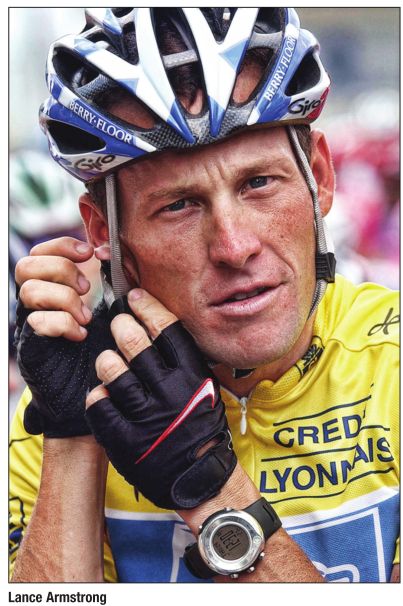Cheating is the American way
What Lance Armstrong teaches us about ourselves
DYSPEPSIANA | James Krohe Jr.
There is no shame in quitting a race you know you can’t win. Lance Armstrong’s shame is the many races he perhaps should have quit rather than win. It was apparently to prevent unsavory facts about his long-rumored doping from coming out into the open that the seven-time Tour de France winner abandoned his years-long legal fight against cycling’s anti-doping authorities.
About Lance Armstrong the Professional Hero I will say little. “Lance” was not an athlete to his adoring acolytes (who always referred to him by his first name, like Oprah) but a Survivor. The career of Lance Armstrong the Professional Athlete is more interesting, if only because of the ways his conduct bears on issues beyond him and cycling.
The Tribune tsk-tsked editorially in its best schoolmarm style. “You know those yellow rubber bracelets that say ‘Livestrong’? You can now get a parody version. It says: ‘Cheat to Win.’” I wish I had license to make them; they would be the next must-have accessory. Armstrong was never typical in his achievements but he was all too American in his embrace of cheating to achieve them. He probably didn’t need to dope to win, as he had superb natural physical gifts and a ferociously competitive temperament. He probably did have to dope to be absolutely certain of winning, especially when riding against riders who themselves had discovered the secrets to better racing through chemistry.
And in our ethical universe, being absolutely certain of winning is paramount. Winning is not the best thing but the only thing in a nation in which nice guys finish last and no one remembers who finished second – and in which, it seems, there are no cliches about excelling rather than merely succeeding, because so few people perceive or respect the difference.
College students crib on finals. Bankers rig the interest rates they charge each other. Financiers conceal the numbers behind the investments they flog to the suckers, Big Pharma suppresses evidence of unsuccessful drug trials. Big-shot college athletes cheat to get into college and cheat to stay there, with the connivance of college officials. Hell, pop singers lip-sync at concerts.
As for the rest of us mere mortals, believers cheat on their gods, spouses on their mates, ordinary Joes on their income taxes. Job-seekers lie on their resumes and parents help their kids do their term papers. Would-be homeowners exaggerate their income and lie about their debt on mortgage applications, and don’t even ask where that down payment came from. Soonto-be retirees contrive to run up the overtime to top off their pension. And what do cancer victims do but resort to chemicals to enhance their natural ability to compete in their races against the disease?
Three professors with NYU’s Program in Sports and Society, in a piece decrying the sanctimony of Armstrong’s critics, state, “Armstrong isn’t being investigated as the only cheater,” they wrote.
“He is in all likelihood just the best, most talented one.” If he competed in a suit instead of Lycra shorts he would be lionized for that, not calumniated. No one stripped Bill Gates of his billions when it was ruled he had illegally constrained competition. University heads fired for corrupting the admissions process are rewarded with pensions and tenured teaching positions. And for rigging state voting rules to deny their opponents’ supporters the ballot, the Republican Party might well be rewarded with the presidency of the United States.
I am less troubled by our Lance Armstrongs being damned as cheaters than I am for only our Lance Armstrongs being damned as cheaters. Bank presidents and major political parties and college presidents and big business CEOs can rig the rules of their competitions to make cheating legal. Bicycle riders, like other athletes paid by corporate sponsors and big media, are obliged to work by competitive constraints that their masters disdain in their own fields.
Those constraints, I will add, are adopted not in the interests of fair play as such, but merely to protect the markets for their games whose customers, even in this most sordid of eras, still want their sports to be pure. We sports fans love our games because we embrace them as the only arena in which fair play exists, honest effort wins its reward and the best man or woman wins. We embrace them not because any of this is true, but because we need to believe that it is true.
As for what it says about a culture that perversely holds its athletes to higher ethical standards than those applied to politicians or business leaders or university presidents or church officials, I will leave to you to ponder. No doubt the late Romans insisted that their gladiators play by the rules too, demanding purity in the contests while the contests that really mattered had long since become mere pantomimes.
Contact James Krohe Jr. at [email protected].